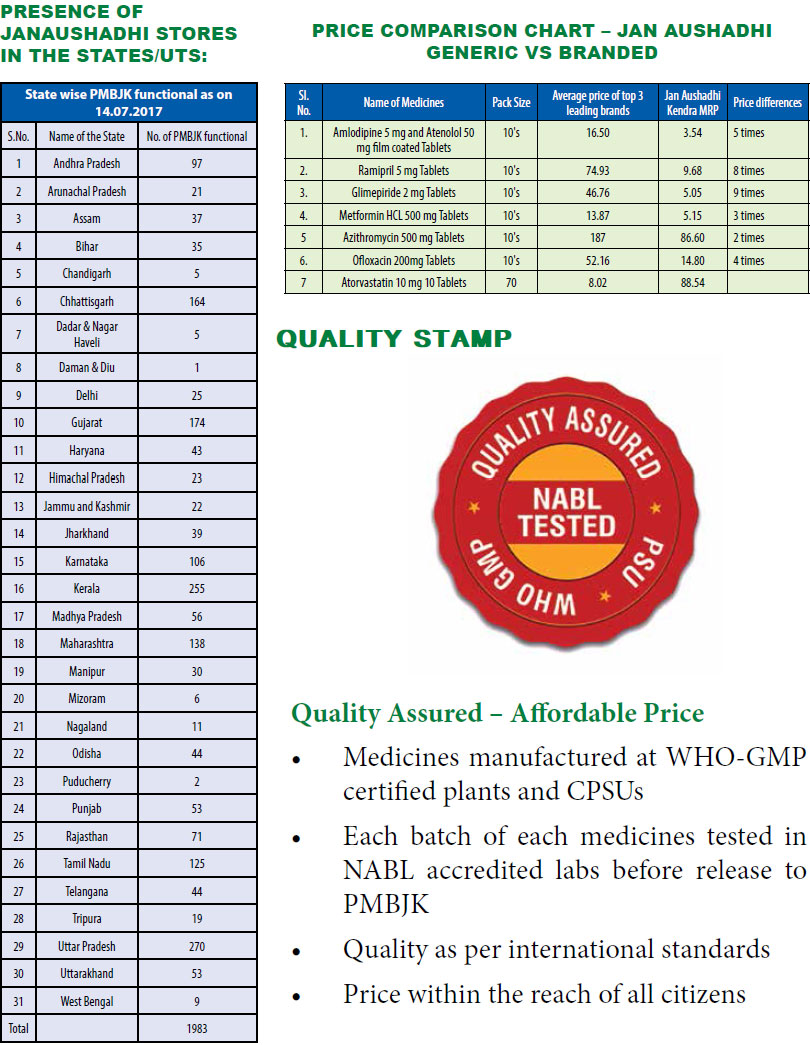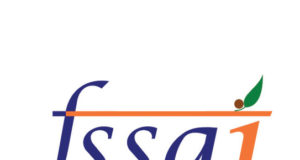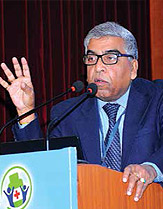 Mr Biplab Chatterjee has vast 41 years of industry experience. He retired as a director from Abbott India heading the commercial operations of legacy Solvay, for around 5 years and Sanofi Aventis for over 36 years. He started his career in the heritage organization Roussel Pharmaceuticals India Limited, the Indian subsidiary unit of Roussel Uclaf France as a Medical Representative and progressed in his career and chaired the position of Senior Director – Sales Operations in Sanofi Aventis. In his career span, he has handled all levels of Sales management, Marketing management, Business support in the commercial and strategic functions. He has been associated with many major brands which are market leaders today, and quite a few won the prestigious OPPI Marketing Excellence Award. He has vast commercial process development & organizational development experience and has successfully handled mentoring lead managers during his tenure. He has been a recognised speaker in various SFE workshops of OPPI and CPHI. His experience augurs well for developing a sustainable & strong organisation. He is now the CEO of BPPI to lead the noble mission of Pradhan Mantri Bhartiya Jan Aushadhi Pariyojana in the country.
Mr Biplab Chatterjee has vast 41 years of industry experience. He retired as a director from Abbott India heading the commercial operations of legacy Solvay, for around 5 years and Sanofi Aventis for over 36 years. He started his career in the heritage organization Roussel Pharmaceuticals India Limited, the Indian subsidiary unit of Roussel Uclaf France as a Medical Representative and progressed in his career and chaired the position of Senior Director – Sales Operations in Sanofi Aventis. In his career span, he has handled all levels of Sales management, Marketing management, Business support in the commercial and strategic functions. He has been associated with many major brands which are market leaders today, and quite a few won the prestigious OPPI Marketing Excellence Award. He has vast commercial process development & organizational development experience and has successfully handled mentoring lead managers during his tenure. He has been a recognised speaker in various SFE workshops of OPPI and CPHI. His experience augurs well for developing a sustainable & strong organisation. He is now the CEO of BPPI to lead the noble mission of Pradhan Mantri Bhartiya Jan Aushadhi Pariyojana in the country.
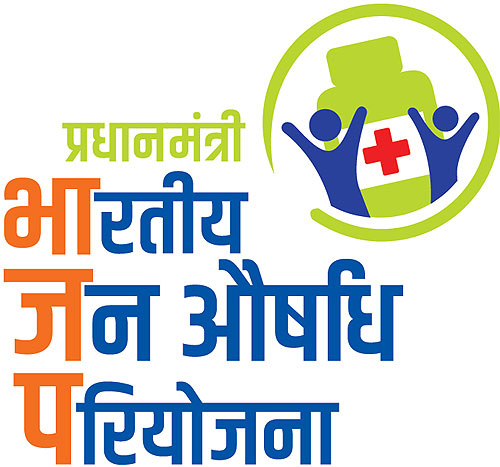
 One day, in GB Hospital, Agartala, in the corridor of the hospital, there stood a poor man, looking blank and helpless. He was looking anxious and not talking to anyone, standing alone on the corridor. The staffs of nearby Janaushadhi Kendra, saw him standing for a long time looking helpless and gloomy. While closing their shop, the staff walked up to the poor man and asked, “What’s wrong with you?” The man started to cry incessantly and sobbingly said, “My son is sick…I brought him to the hospital. The Doctor has seen him and has given me the prescription to get the medicines. I went to the medicine shop outside. They said me, I need 383/- rupees to get those medicines. I am a cycle-rickshawala, my yesterday’s earnings and today morning’s earning is Rs. 80/-, this is all that, I have now. How can I get my son’s medicines with this money? What kind of a father am I, that I am unable to take care of my sick son?”
One day, in GB Hospital, Agartala, in the corridor of the hospital, there stood a poor man, looking blank and helpless. He was looking anxious and not talking to anyone, standing alone on the corridor. The staffs of nearby Janaushadhi Kendra, saw him standing for a long time looking helpless and gloomy. While closing their shop, the staff walked up to the poor man and asked, “What’s wrong with you?” The man started to cry incessantly and sobbingly said, “My son is sick…I brought him to the hospital. The Doctor has seen him and has given me the prescription to get the medicines. I went to the medicine shop outside. They said me, I need 383/- rupees to get those medicines. I am a cycle-rickshawala, my yesterday’s earnings and today morning’s earning is Rs. 80/-, this is all that, I have now. How can I get my son’s medicines with this money? What kind of a father am I, that I am unable to take care of my sick son?”
The Janaushadhi store’s staff told, “Come to the store and let me have a look at the prescription”. He saw, there were four medicines prescribed and all the four were available with them at that time.
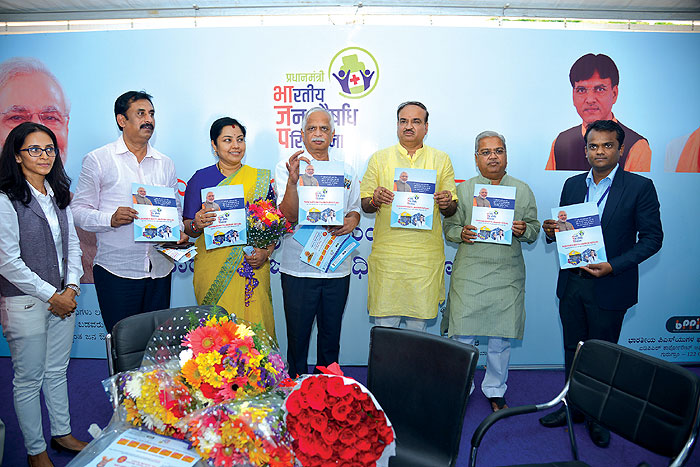
Imagine the cost of those medicines…. it was only 65 rupees !
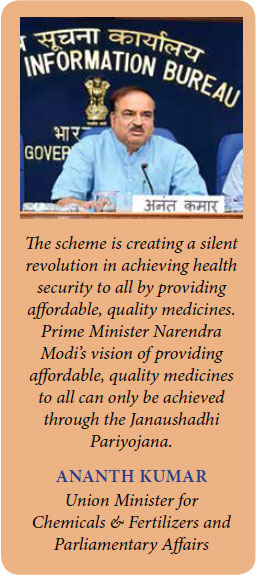 The Janaushadhi store staff told him, don’t cry brother, these are the medicines for your son. Now, take out the 80 rupees you have and we will give you 15 rupees back along with the medicines. The rickshaw-puller gave four 20 rupees notes and got back 15 rupees and the medicines.
The Janaushadhi store staff told him, don’t cry brother, these are the medicines for your son. Now, take out the 80 rupees you have and we will give you 15 rupees back along with the medicines. The rickshaw-puller gave four 20 rupees notes and got back 15 rupees and the medicines.
The rickshaw-puller looked at him and couldn’t believe that the medicines which he was looking for, could be available at Janaushadhi store at such a low price. He then with tears in his eyes, thanked the almighty.
The above is a true incident written in verbatim. The rickshaw-puller belonged to the 60% of our population, who doesn’t have access to most of the medicines due to its high price.
Irony, even after 70 years of Independence, we have around 40% of population who are able to afford the branded medicines. The branded medicine’s market is of 1 lakh 20 thousand crores, where, 6 out of 10 people of the population doesn’t have access to the branded medicines. However, the bright side of the picture is, India is one of the leading countries to export world class generic medicines to more than 180 countries. Out of every 7 medicines consumed in the world, 1 is from India. Look at the dichotomy, on one hand 6 out of 10 persons do not have access to medicines, whereas India is within the first four countries of the World, producing quality generic exporting to other countries.

Pradhan Mantri Bhartiya Janaushadhi Pariyojana (PMBJP) is a scheme designed to bridge the above dichotomy. It is dedicated, to provide quality medicines at an affordable price to every citizen of the country, irrespective of all cast, creed and economy.
The intention is to provide health security to our country-men, at the earliest, as soon as possible.
Here is a brief on, “Pradhan Mantri Bhartiya Janaushadhi Pariyojana (PMBJP)”
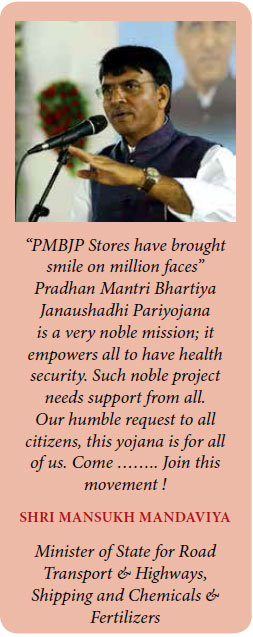 Background: With a view to achieve the objective of making available quality generic medicines at affordable prices to all, ‘Jan Aushadhi Scheme’ was launched by the Department of Pharmaceuticals, Ministry of Chemicals & Fertilizers, Government of India in November 2008 across the country. The Scheme is being implemented through an agency namely Bureau of Pharma PSUs of India (BPPI), Gurgaon, Haryana which is working under administrative control of Department of Pharmaceuticals, Ministry of Chemicals & Fertilizers, Government of India.
Background: With a view to achieve the objective of making available quality generic medicines at affordable prices to all, ‘Jan Aushadhi Scheme’ was launched by the Department of Pharmaceuticals, Ministry of Chemicals & Fertilizers, Government of India in November 2008 across the country. The Scheme is being implemented through an agency namely Bureau of Pharma PSUs of India (BPPI), Gurgaon, Haryana which is working under administrative control of Department of Pharmaceuticals, Ministry of Chemicals & Fertilizers, Government of India.
Revamping of Jan Aushadhi Scheme – In September 2015, the ‘Jan Aushadhi Scheme’ was revamped as ‘Pradhan Mantri Jan Aushadhi Yojana’ (PMJAY). The Hon’ble Minister of Finance while presenting the Budget for the year 2016-17 in Parliament, made a special mention on PMJAY. The excerpt of the Budget Speech of Hon’ble Finance Minister is reproduced below:
“Making quality medicines available at affordable prices has been a key challenge. We will reinvigorate the supply of generic drugs. 3,000 Stores under Prime Minister’s Jan Aushadhi Yojana will be opened during 2017.”
Renaming of PMJAY – To give impetus to the scheme and for greater outreach, the scheme was again renamed as ‘Pradhan Mantri Bhartiya Janaushadhi Pariyojana’ (PMBJP) in December 2016 which was followed by a big media campaign in national and regional newspapers inviting individuals to participate in the scheme.
Status of Roll Out:-
The year-wise status and present status of PMBJKs opened in the country is as under:

Salient features of the scheme:
• Ensure access to quality
medicines
• Extend coverage of quality generic
medicines so as to reduce and
thereby redefine the unit cost of
treatment per person
• Create awareness about generic
medicines through education
and publicity so that quality
is not synonymous with only
high price
• A public programme involving
Government, PSUs, Private
Sector, NGO, Societies, Cooperative
Bodies and other
Institutions
• Create demand for generic
medicines by improving access
to better healthcare through
low treatment cost and easy
availability wherever needed
in all therapeutic categories.
Target beneficiaries is general public of India as PMBJP aimed to reduce out of pocket expenditure on medicines
Likely Impact: PMBJP seeks to keep product price within 50% of branded product price to make it affordable for all, especially the poor. It has resulted in substantial amount of savings for the people
Potential for Job Creation: PMBJP gives self-employment and income opportunity. It will help unemployed pharmacist to start a business.
Financial Support to the Applicants – following financial assistances are given to the applicants for opening of PMBJP Kendras:
(a) For opening PMBJP Kendra by State government or Government agencies in any government buildings owned by government bodies like Railways/ State Transport Department/ Urban local bodies/ Panchayati Raj Institutions/ Post Offices/ Defence/PSU’s etc. Government Hospitals / Medical College premises, one-time financial assistance upto Rs. 2.50 lakh is provided as per the details given below:
(i) Rs. 1 lakh reimbursement of furniture and fixtures.
(ii) Rs. 1 lakh by way of free medicines in the beginning.
(iii) Rs. 0.50 lakh as reimbursement for computer, internet, printer, scanner, etc.
(b) For PMBJP Kendras run by private entrepreneurs / pharmacists / NGOs / Charitable organizations that are linked with BPPI headquarters through internet (using BPPI provided software) will get incentive upto Rs. 2.5 lakhs. This will be given @ 15% of monthly sales subject to a ceiling of Rs. 10,000/ per month upto a total limit of Rs. 2.5 lakhs.

(c) In north eastern states, naxal affected areas and tribal areas, the rate of incentive will be 15% and subject to monthly ceiling of Rs. 15,000/- upto a total limit of Rs. 2.5 lakhs.
(d) The applicants belonging to weaker sections like SC/ST/Differently abled are provided medicines worth Rs. 50,000/- in advance within the incentive of Rs. 2.5 lakhs which will be provided in the form of 15% of monthly sales subject to a ceiling of Rs. 10,000/- per month upto a total limit of Rs. 2.5 lakhs.
To facilitate this scheme, country’s apex medical regulatory body, the Indian Medical Council (MCI) had issued guidelines in 2016 to all practicing medical practitioners of the country for writing generic medicines with brand names of the medicines in legible handwriting. Action will be taken against the doctors if they do not follow the instructions. Prime Minister Narendra Modi has also said that there should be a law on low-cost medicines. MCI has advised doctors to follow its 2016 notification, in which it has amended Section 1.5 of the Indian Medical Council Professional Conduct, Etiquettes and Ethics Regulation 2002.
The scheme is to reach every poor of the country. As a future expansion plan of PMBJKs in the country, the Ministry of Railways has also come on board to open Janaushadhi Kendra at over 1000 railway stations across the country in collaboration with the Ministry. The Ministry of Chemicals & Fertilizers has sent an advisory to all State Governments to open PMBJKs in every District headquarters, Tehsil / Block and bus stands etc. to increase the reach of affordable medicines to the poor and underprivileged citizens of the country.
